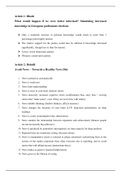Summary
Summary Media & Informatie all articles summarised - Radboud University, Communicatiewetenschap, Year 2
- Course
- Institution
Summaries containing the most important points of all 22 articles that are needed for the Media & Informatie exam. Article 1: Bhatti: What would happen if we were better informed? Simulating increased knowledge in European parliament elections, Article 2: Dobelli: Avoid News – Towards a Healthy...
[Show more]



